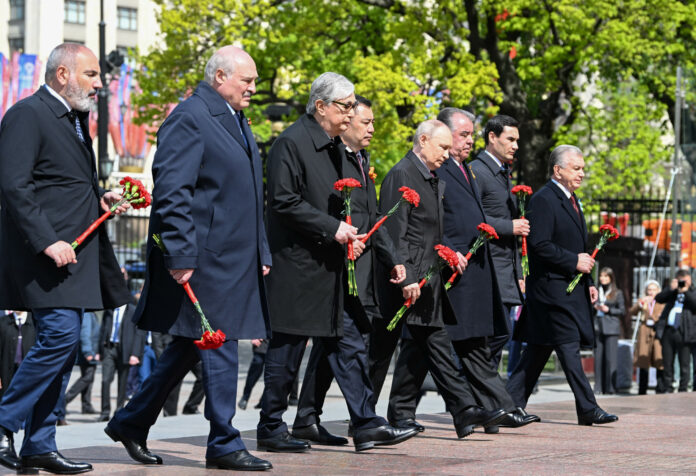Vladimir Putin’s full-scale invasion of Ukraine has hurt Russia’s image as a regional leader among post-Soviet countries that Moscow considers to be in its backyard, according to polling.
Data gathered by Gallup found that approval of Russia’s leadership among some, but not all, of Russia’s neighbors fell sharply between 2021 and 2022, suggesting that it is losing its sphere of influence.
The margin of error in the surveys, conducted through face-to-face and telephone interviews, differed among the 15 former Soviet nations but was no higher than 3.8 percent. The polling company concluded that in “much of the region where Russia’s power and influence are greatest, its actions have seriously eroded its status and prestige.”
ALEXEY MAISHEV/Getty Images
While the Baltic states have turned away from Moscow, Russia considers other former Soviet countries in Central Asia and parts of the Caucasus, as well as Belarus, as central to its projection of power, taking pains to maintain close economic and diplomatic ties with them.
However, Gallup found that in four countries historically sympathetic to Russian leadership (Armenia, Moldova, Kazakhstan, and Azerbaijan), the percentage who disapprove of Moscow now exceeds the percentage who approve.
Approval of Russian leadership in Armenia dropped 13 percentage points to 32 percent between 2021 and 2022, while disapproval rose 20 percentage points to 58 percent.
In Azerbaijan, 23 percent of people surveyed approved of Russian leadership while 46 percent disapproved. This was a marked difference from 2019 when the figures were 60 percent and 27 percent respectively.
Gallup said that Armenia and Azerbaijan were examples of how the war in Ukraine had distracted Russia from its traditional role as a regional power broker and chief mediator.
Moscow has “historically acted as a stabilizing force in the disputed territory of Nagorno-Karabakh,” according to Gallup. The polling company found that the largest shift in perception of Russian leadership occurred after the second Nagorno-Karabakh War in 2020 and the invasion of Ukraine.
“Leaders in these countries may see an opportunity to carve greater autonomy from a less engaged Russia, and the populations may be reflecting domestic elite messaging,” per Gallup.
The violation of territorial sovereignty in Ukraine is among the causes of concern in countries with their own ethnic divisions. In Moldova, Russian peacekeepers remain in the breakaway region of Transnistria and Chisinau is worried Russia may try to connect this territory.
In Kazakhstan, where a large ethnic Russian population lives in the territory bordering Russia, some people may resent the Russian-led intervention in early 2022 that helped put down an uprising sparked by a huge rise in oil prices, Gallup said.
However, approval of Russia’s leadership in Uzbekistan and Kyrgyzstan remained broadly high at 63 percent in both Central Asian countries, although this was a drop from earlier.
Globally, approval of Russia’s leadership across 137 countries sank from a median of 33 percent in 2021 to 21 percent in 2022. Meanwhile, disapproval of Russia across these countries hit a median of 57 percent in 2022, a dramatic increase from 38 percent the previous year.
“This seismic shift in public opinion may signal the twilight of Europe’s last empire,” said Gallup.
Newsweek has contacted the Russian foreign ministry for comment


